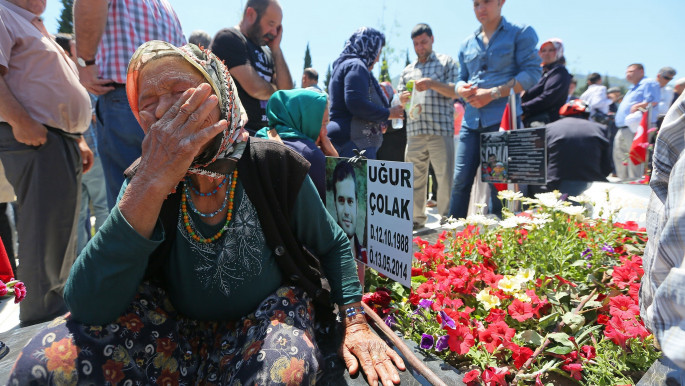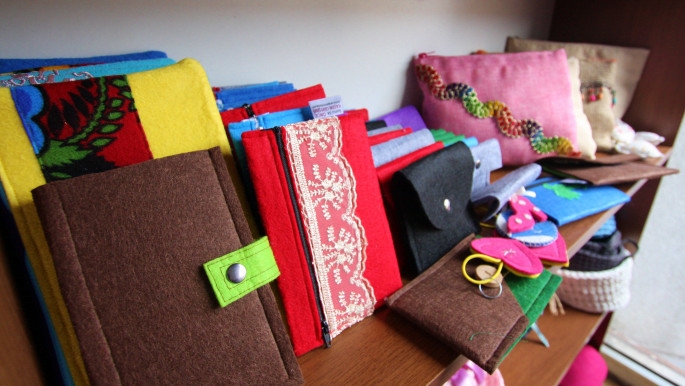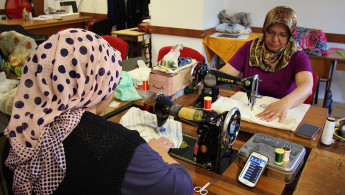It's business time in Turkish housewives' gender equality battle
Women continue to face daily threats of domestic violence, discrimination and a struggle for freedom.
The biggest issue is an underrepresentation of women in decision-making roles – the key to instigating change.
But in an extraordinary turn of events, women in a remote Turkish town are transforming themselves from housewives to businesswomen and earning a living for the first time in their lives.
Four years ago, Soma suffered the worst mining disaster in the country's history, killing 301 people and leaving its residents utterly shattered.
Not only have devastated families had to deal with the grief of losing husbands, sons and brothers, but also the prospect of a decline in jobs for the remaining men in the town.
 |
|
| One of the Soma mine disaster victim's 80-year-old grandmother mourns over his grave at the cemetery in the Turkish town of Soma [Getty] |
 |
|
| The Soma mining disaster memorial where the 301 people killed are remembered [Charlie Faulkner] |
However, out of the tragic circumstances a successful textile business run only by women has been born.
It is a development which is inadvertently tackling the outdated ideas of women's roles within society from the bottom up, starting from the lady's own homes.
The Soma Women's Cooperative, which currently has around 80 women involved in the work, now produces clothes for major Turkish companies Koton, Bayman and English Home, as well as international customers.
"We were housewives who spent our time remaining inside our homes," says mother-of-one Emel Inel.
"I was one of the lucky ones – my husband wasn't working in the mines but many women either lost their husbands or their husbands lost their jobs following the tragedy. The women here were left with no choice but to go out to work."
 |
|
| Mother-of-one Emel is among the women who have joined the cooperative [Charlie Faulkner] |
 |
Many women either lost their husbands or their husbands lost their jobs following the tragedy. The women here were left with no choice but to go out to work |  |
As a result of the formation of the cooperative, hope has been restored – simultaneously empowering daughters and teaching sons that women can be more than just homemakers.
It has also inspired other women, like Emel, to get involved with the project.
"Our lives have been completely transformed," says the 44-year-old.
"We earn our own money, we now have active social lives and we've developed a confidence we never had before."
One mother tells The New Arab that she has been able to use her wages to pay for her daughter's driving lessons. Another could afford to organise private tutoring lessons for her children, while many of the women are simply able to treat themselves to jewellery now and again.
"It's a novelty they never even dreamed of before," says Emel.
 |
|
| Four years ago, Soma suffered the worst mining disaster in the country's history [The New Arab] |
In Soma there are no job opportunities for women, she says, so the cooperative has offered ladies like her a unique opportunity.
"It was a nerve-racking prospect at first," she says. "We were worried about whether we would actually be successful. It was a bit of a gamble."
But it is a gamble that has paid off.
One year ago, Dress Best, a uniform manufacturing company based in Istanbul, joined forces with Women Entrepreneurs Association of Turkey (Kagider) – the organisation behind the initial launch of the cooperative – in the hope of expanding the project.
The company produces uniforms for hospitals, hotels, security and cleaning companies, as well as airport staff, for countries throughout the Middle East and Africa. Its founder, Rana Tulin, was named Turkey's female entrepreneur of the year in 2016.
"It's a fact that there are not many women involved in decision-making roles – both in the business world and in politics," says 61-year-old Tulin.
Dress Best has invested in further training for the Soma women and provided new machines to ensure they are equipped with the resources needed to produce the high-quality garments.
 |
|
 The women produce items like wallets and also learn how to produce embroidery designs [Charlie Faulkner] |
"The women involved in the cooperative are not just learning how to sew clothes and bags, they are being taught how to run a successful business and how to grow it," says Tulin.
"There are a lot of hotels in the Aegean Sea region which means there is a lot of opportunity. It was important to create a sustainable project."
Women's empowerment in Turkey is more crucial than ever. Domestic violence remains rife throughout its society.
In June, 39 women were killed and 22 women were subjected to sexual violence, according to the Turkish We Will Stop Femicide Platform. The same organisation states a total of 409 women were killed by men and 332 women were subjected to sexual violence in 2017.
In addition, women continue to be hugely unrepresented in politics. In 2015, the ratio of women involved in politics across the board stood at 18 percent. Since then, the figure has dropped to 13.5 percent, according to Ka.der, an association aimed at supporting women in politics.
Although a record number of female candidates ran in Turkey's election last month, very few of the 904 women were in high enough positions to have any real chance of making it into parliament. The number of women who were elected did increase by 2.6 percent, compared to 2015. However, only 103 of the 600-seat assembly have been won by women.
Dr Zehra Kabasakal Arat is a professor of Political Science at the University of Connecticut and studies human rights with an emphasis on women's rights. She describes the situation for women in Turkey as having "hit rock bottom".
"Numbers don't mean much for me, because demographic representation does not mean advocacy of women's rights. But, on the other hand, the dismal numbers of women involved in politics is an indicator of the outlook," says Arat, who is a Turkish American and has been living in the US since the 1980s.
"Starting in the mid-80s there was a pretty viable women's movement: it corresponded with an era of reform because there was the prospect of joining the EU."
However, she says this is no longer the case and the impact of the women's movement has faded away.
 |
The main problem is that gender equality is not seen as a democratic right... I'm sure a large portion of people would like to see this change, but they don't see it as a core concern |  |
"In essence, the main problem is that gender equality is not seen as a democratic right," says Arat. "I'm sure a large portion of people would like to see this change, but they don't see it as a core concern.
"President Erdogan maintains a facade of democracy but essentially it is dictatorship," she says, highlighting the difficulty in fighting for any change in Turkey's current climate of fear and oppression.
There is still hope however, with pockets of women finding the courage to get involved with cooperatives – like the one in Soma – while others continue to fight for the cause.
Beritan Canozer is a journalist based in Turkey's southeast city of Diyarbakir. She works for JINNEWS – an all-female news agency now in its second formation after the government forced the closure of former JINHA agency.
"The number of women who struggle every day is increasing. They face work place exploitation, physical and psychological violence, harassment, rape and forced marriage," says Canozer.
"The media in Turkey is entrenched in male-dominated language with a promise of how men will transform women's lives. We reporters at JINNEWS have to be the voices of the women's struggle."
Charlie Faulkner is a British journalist based in Istanbul whose work focuses on migration and women's rights.
Follow her on Twitter: @Charlie_Faulk


![President Pezeshkian has denounced Israel's attacks on Lebanon [Getty]](/sites/default/files/styles/image_684x385/public/2173482924.jpeg?h=a5f2f23a&itok=q3evVtko)



 Follow the Middle East's top stories in English at The New Arab on Google News
Follow the Middle East's top stories in English at The New Arab on Google News


